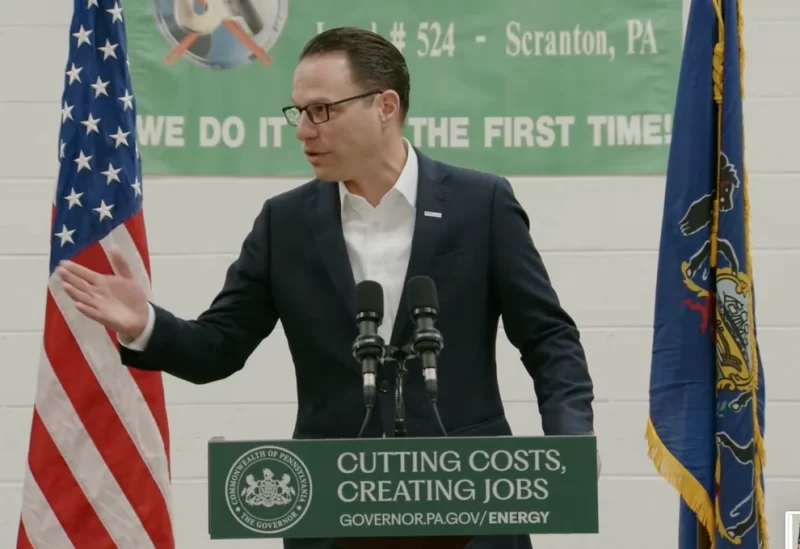By Anthony Hennen | The Center Square
(The Center Square) — Gov. Josh Shapiro introduced a new plan to limit carbon emissions from power plants on Wednesday that echoes the program legislative Republicans abhor so much they sued the administration to thwart it.
This time, however, instead of supporting a multi-state auction like the Regional Greenhouse Gas Initiative, or RGGI, Shapiro wants to keep the revenue collected from a state-imposed emissions cap and trade program within Pennsylvania itself.
And, he added, if lawmakers get behind it, he will back away from RGGI and the appeal he filed to overturn a Commonwealth Court ruling that put Pennsylvania’s participation in it on hold.
“There are consequences to doing nothing,” Shapiro said. “We’ll see more pollution and damage in our communities already suffering the impacts of climate change … They’re choosing to fall behind if they choose to do nothing.”
Formally named the Pennsylvania Climate Emissions Reduction Act and the Pennsylvania Reliable Energy Sustainability Standard, the governor’s administration just calls the new proposals PACER and PRESS.
Embracing his plans, he argued, would save residents $252 million over five years and create 14,500 jobs.
“Pennsylvania is falling behind in the race to create clean and reliable energy – and we must take action to be more competitive, ensure our consumers pay less for their electricity bills, and create more jobs and opportunities for our businesses to grow and our workers to get ahead,” he said.
During a news conference at the United Association Local 524 in Scranton, Shapiro said PRESS and PACER will “rekindle that competitive spirit” that’s faded in recent decades.
With PACER, Shapiro wants the Department of Environmental Protection to “set a cap for the amount of carbon that large power plants can produce and release into the air,” he said. Power plants (about 55 in the state) would buy credits to offset pollution.
About 70% of the money would go into giving residents rebates for their electricity bills and 30% would get reinvested into “large energy-producing facilities in Pennsylvania,” the governor said, like Hunlock in Luzerne County and Homer City in Indiana County.
“No one in Pennsylvania will pay more for electricity because of PACER — and many will pay less,” Shapiro said.
He emphasized that the state would set caps and prices, not other states or regional councils – like with RGGI’s carbon tax. In the latter, 11 states along the Mid-Atlantic and Northeast set a cap for all power generators within the group. The money is then reinvested into green energy programs across the participating states.
Critics of carbon taxes say the cost of the emission caps will trigger higher utility bills for residents and businesses alike. A Commonwealth Court ruling issued in November deemed the limits that would have been imposed through RGGI on power plants unconstitutional because the legislature did not approve them.
Aside from downsizing the program to Pennsylvania itself and creating its own emissions reduction timeline, Shapiro’s plans work in much the same way.
With PRESS, the governor would update reliable energy sustainability standards to require 35% of Pennsylvania’s electricity from clean energy sources like solar, wind, and nuclear. Another 10% would come from “sustainable sources” like hydropower and battery storage, and 5% from “ultra-low emission forms of natural gas and other traditional fuels.”
“In a nutshell, PACER will lower costs for consumers, reduce pollution in our communities and protect and create energy jobs,” Shapiro said.
Senate Republican Majority Leader Joe Pittman, R-Indiana, appeared frustrated by Shapiro’s unwillingness to withdraw his appeal unless lawmakers adopt his plans instead. Residents bear the brunt of the obstinance, he said, via rising utility bills.
He also noted that putting limits on electric generators in Pennsylvania alone gives a leg up to their competitors – like Ohio, the state Shapiro is “tired” of losing to – who also buy and sell energy in the power grid marketplace.
“Families are feeling the strain of inflation and increased household expenses, which must be a chief concern when implementing any changes to energy policy,” Pittman said. “Pennsylvania needs to put electric generation, grid reliability and consumer affordability first, and our Senate Republican Majority will continue to focus on initiatives to promote investment and innovation here in Pennsylvania.”
The governor expects Democratic legislators to introduce the bills in the General Assembly sometime next week.
Once again, he repeated his view that growing the economy and protecting nature aren’t mutually exclusive.
“We’ve gotta reject the false choice between protecting energy jobs and protecting the planet,” Shapiro said. “We can do both – we must do both. Doing nothing at this moment is not an option.”
